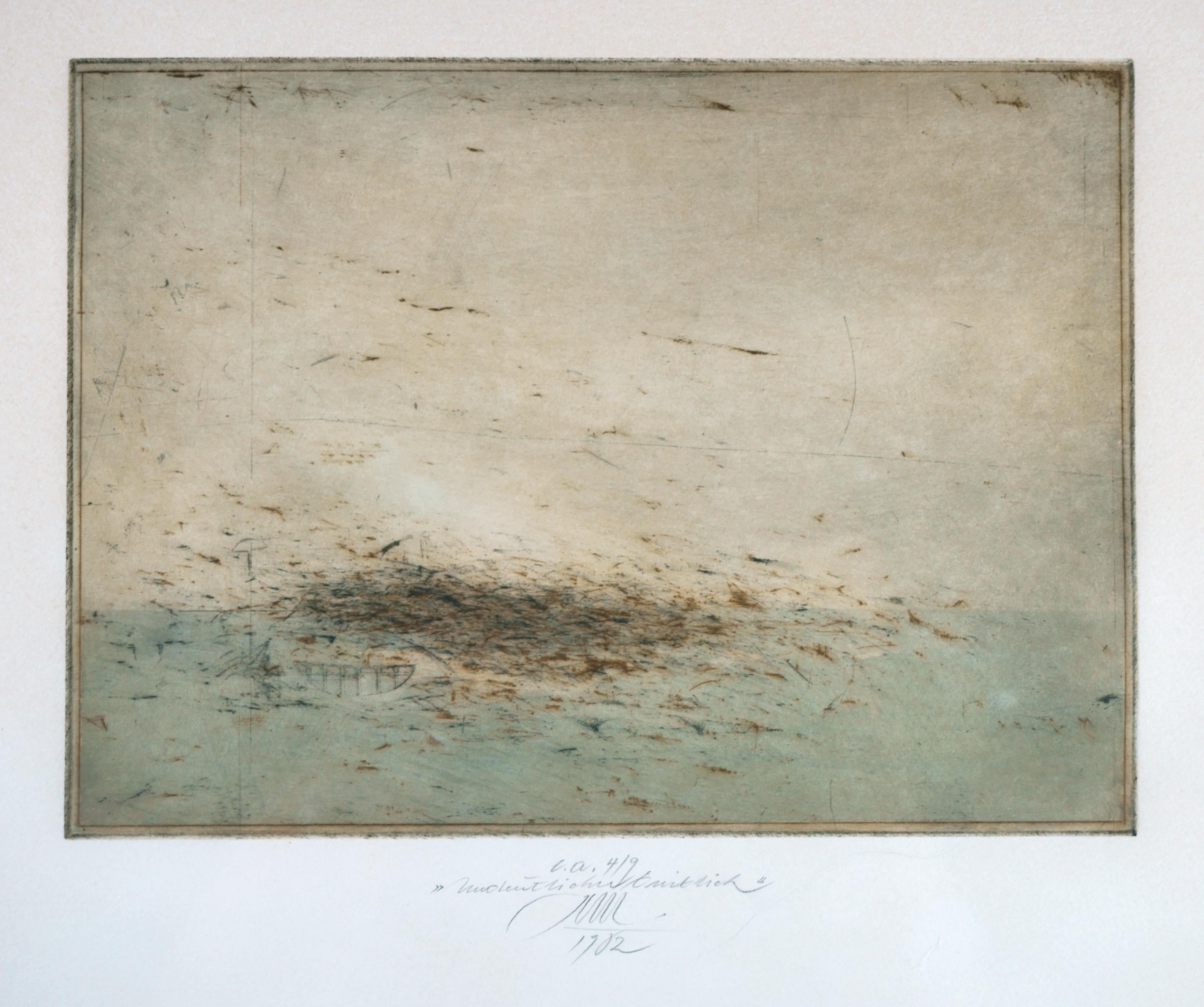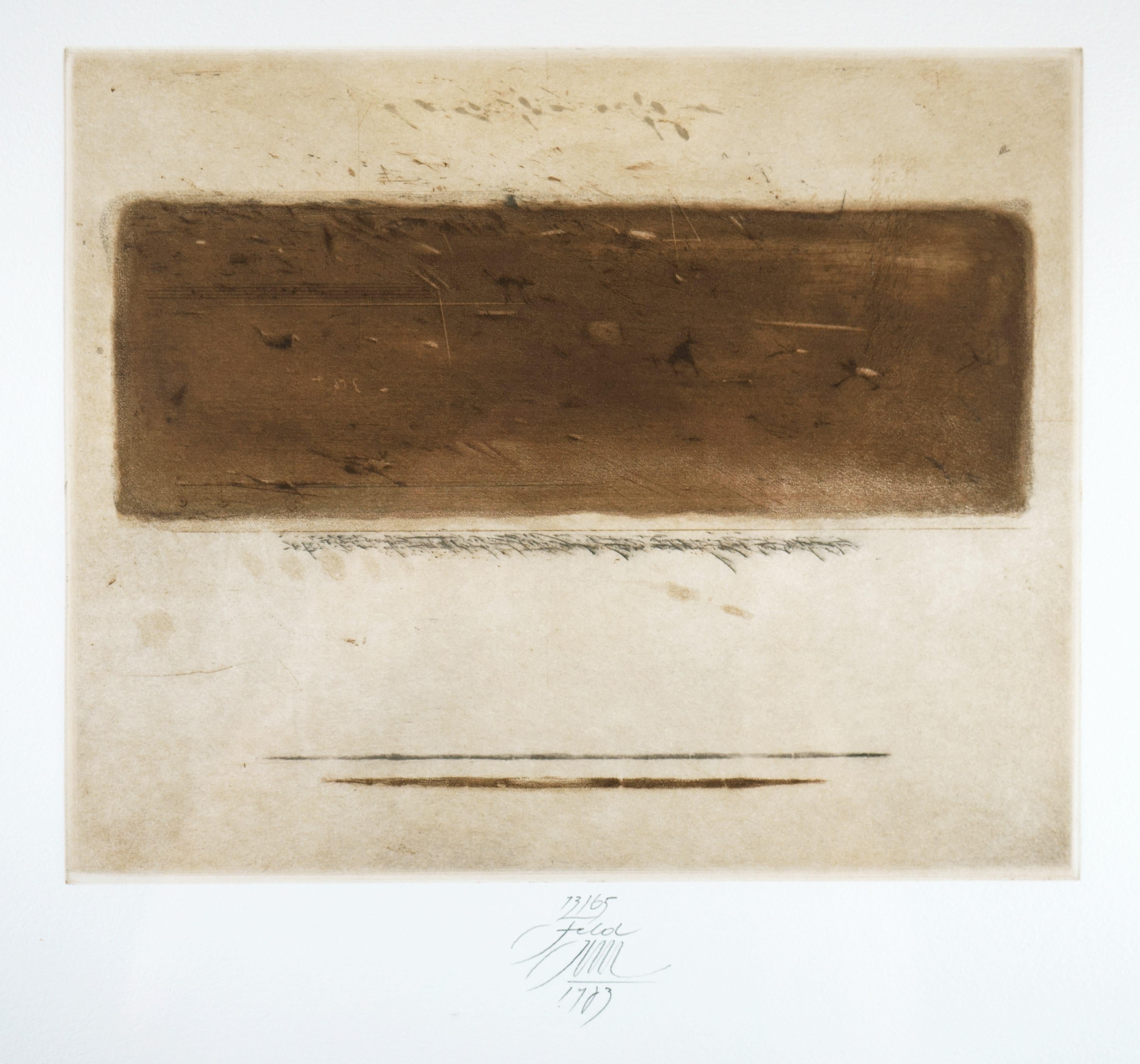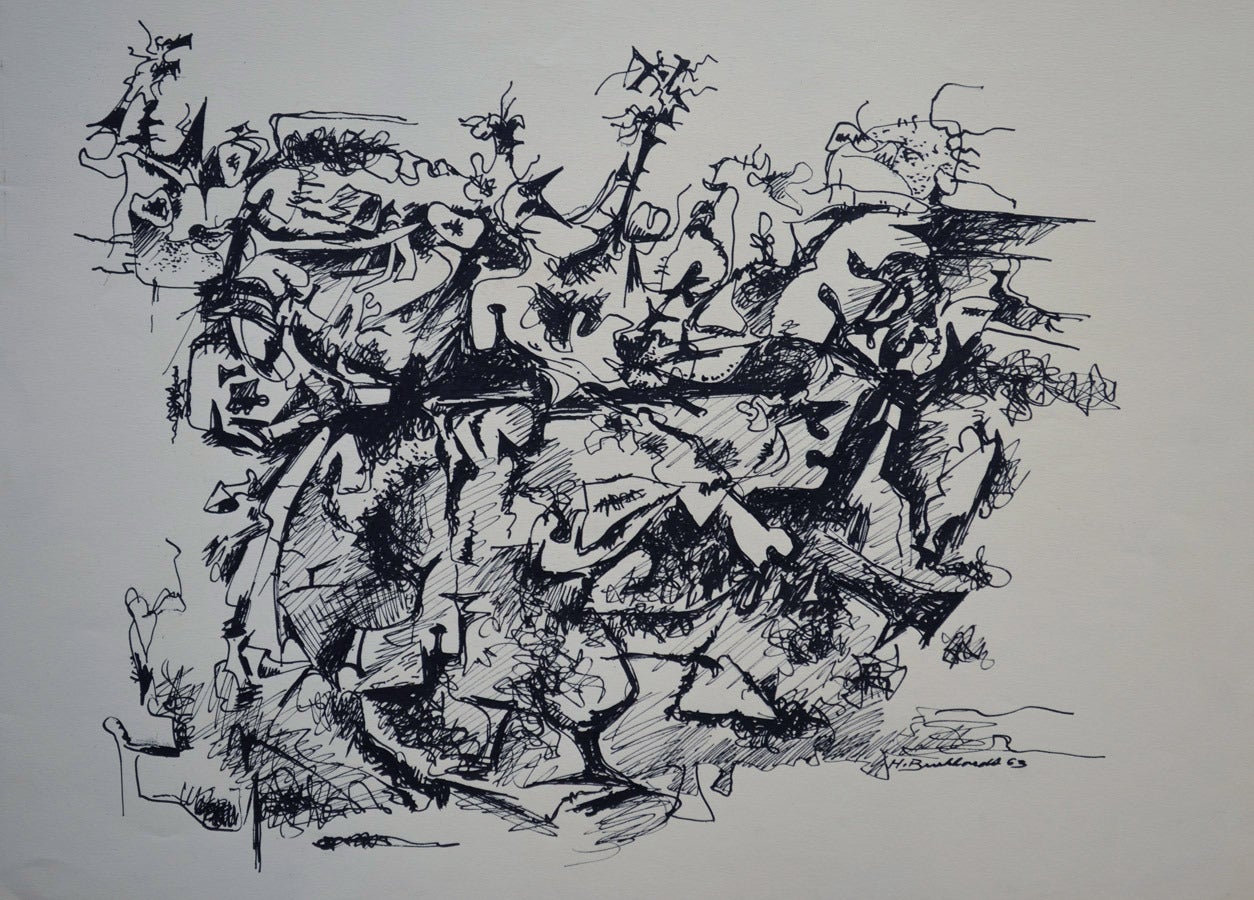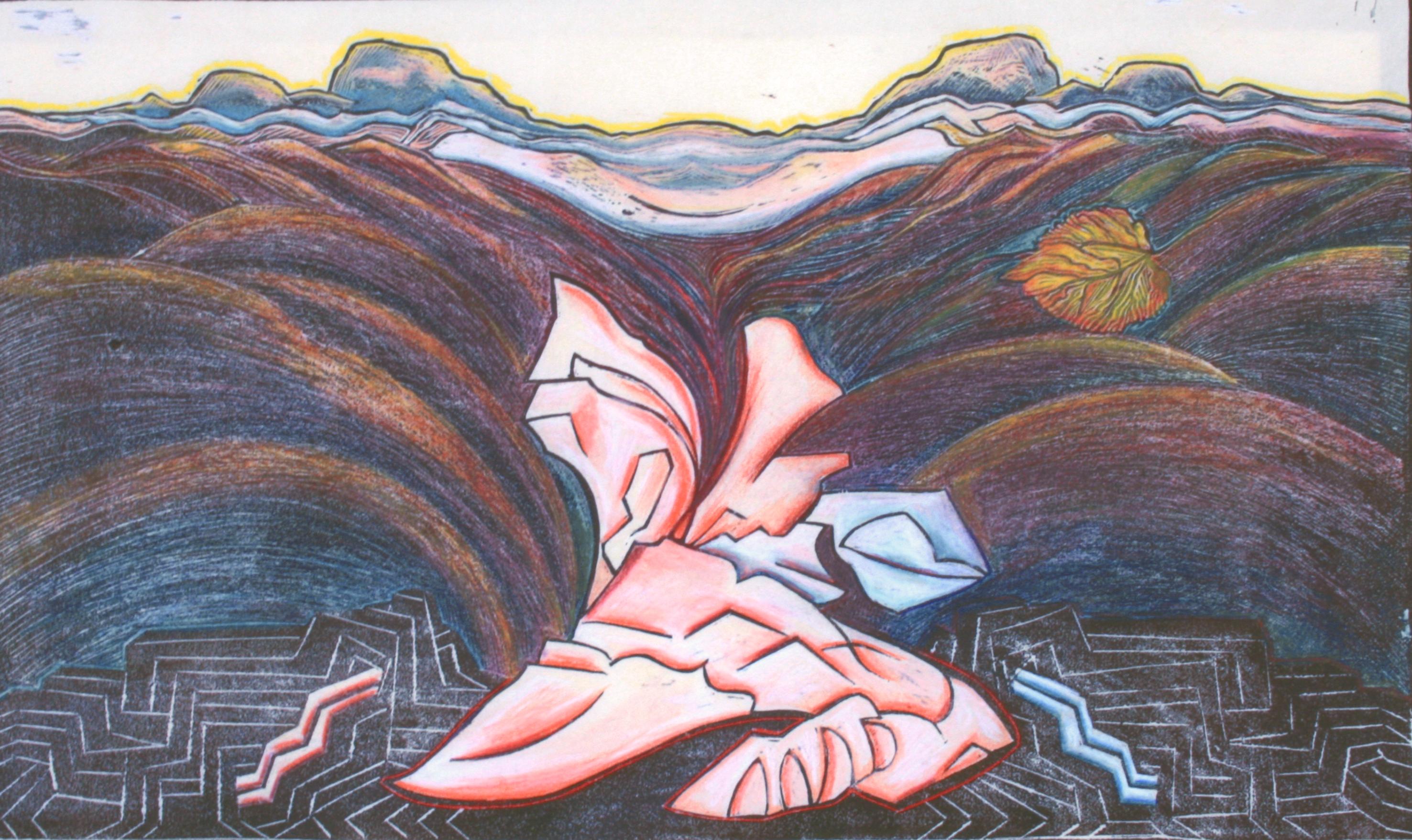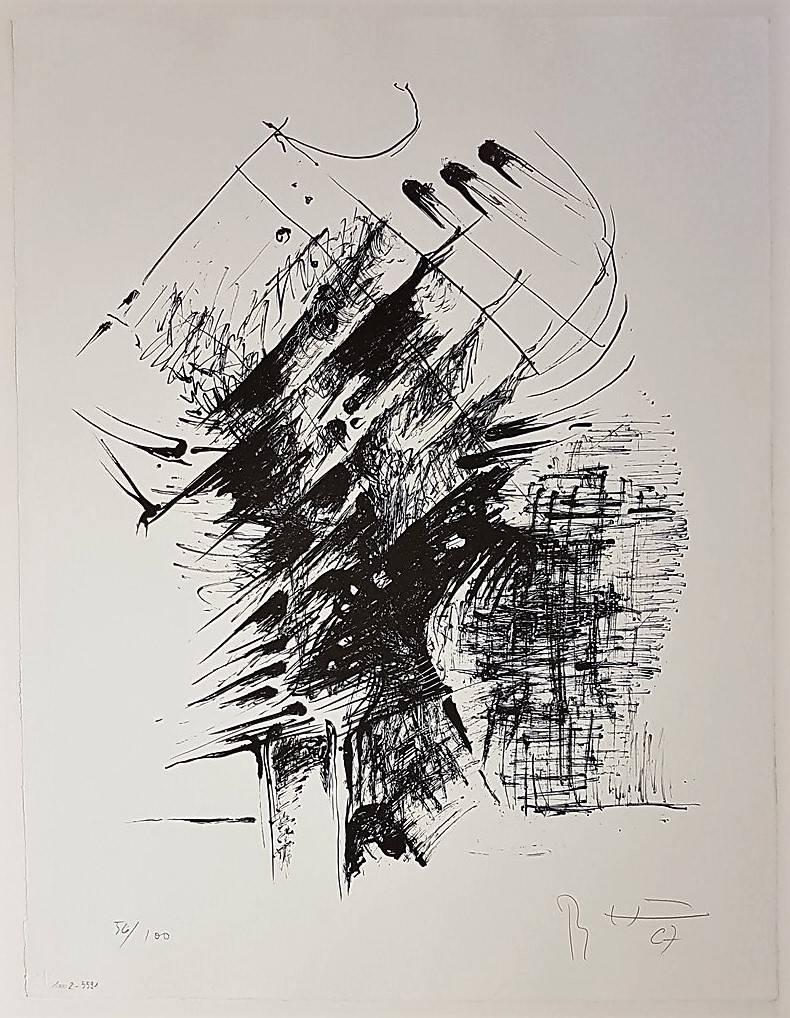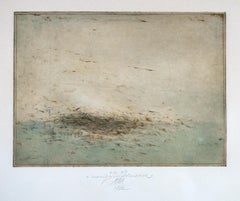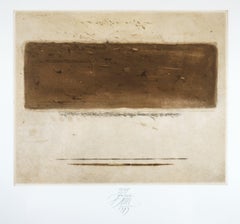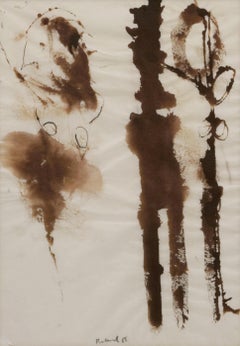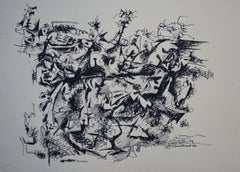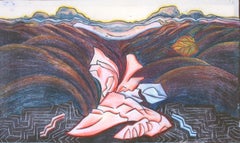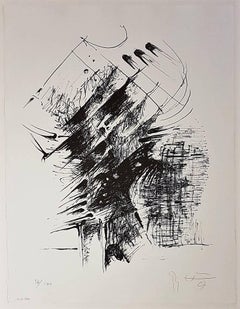Items Similar to Aus dem Totenbuch einer Stadt (IV) - The presence of the submerged -
Want more images or videos?
Request additional images or videos from the seller
1 of 5
Karl MordsteinAus dem Totenbuch einer Stadt (IV) - The presence of the submerged -1983
1983
$370.03
$462.5420% Off
£278.11
£347.6420% Off
€312
€39020% Off
CA$512.68
CA$640.8520% Off
A$557.27
A$696.5820% Off
CHF 298.31
CHF 372.8920% Off
MX$6,736.06
MX$8,420.0820% Off
NOK 3,759.34
NOK 4,699.1720% Off
SEK 3,467.08
SEK 4,333.8520% Off
DKK 2,376.74
DKK 2,970.9320% Off
About the Item
Karl Ludwig Mordstein (1937 Füssen - 2006 Wilszhofen), From the Book of the Dead of a City (IV), 1983. Color etching, copy 16/60, 15.5 x 18.5 cm (image), 30 x 35 cm (sheet), 33.5 x 38.5 cm (frame), titled, numbered, monogrammed and dated in lead. Framed behind glass.
- In very good condition.
- The presence of the submerged -
About the artwork
The multicolored aquatint etching bears the poetic title "From the Book of the Dead of a City (IV)". The reference to a book, combined with the Roman numeral, suggests that the image is part of a narrative, the fourth chapter of which is before us here. Thus, the sunken city is not erased, but continues to be present in its place, forming - as the numbering indicates - different stages, even if the city as such is no longer visible. Karl Mordstein has made this mysterious presence in the invisible tangible in a haunting way. The brown-green-yellow tones alone have an intense suggestive power. The yellow hills in the background have the effect of a desert landscape, making it clear that this is an inhospitable region, even though the desert sand may harbor something underneath. The dominant foreground is an abstract illustration of a tree growth that looks like a wild thicket, seemingly impenetrable because of the dark tonality. A filigree lattice structure is laid over this area, which has an architectural quality and allows the submerged city to become present. On the other hand, the fluctuating line fragments of the sky, which are just as moving as the dramatically undulating thicket, make the doom present. The chapter of the Book of the Dead of a city, moving in itself, nevertheless unfolds a gravitational calm through the color chord, which animates the viewer to immerse himself in the picture.
About the artist
After graduating from the Werkkunstschule in Augsburg, Karl Mordstein worked as a commercial artist in Munich before becoming a freelance artist and concentrating entirely on his own creations. In 1970 Mordstein married the sculptor Sinen Thalheimer and the artist couple moved to Starnberg. In 1972, Mordstein had his first solo exhibition in Munich, which marked the beginning of an active international exhibition career that lasted for decades. From 1987 the couple lived on the Hollerberg in Wilzhofen.
"It is certainly not wrong to recognize in the impression of his calmly floating color drawings the expression of a state of mind that owes itself precisely to this conscious turning away from the hectic art market: concentrated serenity. It is not a changing state of mind, but an empathy with the supra-individual rhythms of creation, the perpetual genesis in the natural cycle of becoming and passing, which is expressed in them."
- Stefan Tolksdorf
Selected Bibliography
Karl Mordstein. Aquarelle, Gouachen 1972 – 1975, Galerie Angst und Orny, München 1975.
Juliane Roh: Karl Mordstein. Bilder, Paintings 1976 – 79, Frankfurt a. M. 1979.
Siegfried Salzmann (Text): Karl Mordstein. Arbeiten auf Papier, Galerie Dorothea van der Koelen, Mainz 1982.
Galerie Heimeshoff (Hrsg.): Karl Mordstein. "Seelen-Notate"; Bilder, Arbeiten auf Papier, Bildkästen; 1985 – 1988, Essen 1988.
Stefan Tolksdorf (Text): Lebenszeichen. Mordstein, Karl und Sinen Thalheimer, Essen 2009.
GERMAN VERSION
Karl Ludwig Mordstein (1937 Füssen – 2006 Wilszhofen), Aus dem Totenbuch einer Stadt (IV), 1983. Farbradierung, Exemplar 16/60, 15,5 x 18,5 cm (Darstellung), 30 x 35 cm (Blattgröße), 33,5 x 38,5 cm (Rahmen), in Blei betitelt, nummeriert, monogrammiert und datiert. Hinter Glas gerahmt.
- in sehr gutem Erhaltungszustand
- Die Präsenz des Untergegangenen -
zum Kunstwerk
Die mehrfarbige Aquatintaradierung trägt den poetischen Titel „Aus dem Totenbuch einer Stadt (IV)“. Die Angabe, es handele sich um ein Buch im Verbund mit der römischen Ziffer suggeriert, das Bild wäre Teil einer Erzählung, deren viertes Kapitel hier vor Augen stünde. Damit ist die untergegangene Stadt nicht ausradiert, sondern weiterhin an ihrem Ort präsent und bildet – wie die Nummerierung markiert – verschiedene Stadien aus, auch wenn die Stadt als solche gar nicht mehr sichtbar ist. Diese geheimnisvolle Präsenz im Nicht-Sichtbaren hat Karl Mordstein auf eindringliche Weise erfahrbar gemacht. Bereits die braun-grün-gelbtonale Farbigkeit entfaltet eine intensive Suggestivkraft. Die gelben Hügel des Hintergrundes wirken wie eine Wüstenlandschaft, die verdeutlicht, dass es sich um eine unwirtliche Region handelt, wobei der Wüstensand jedoch etwas unter sich bergen mag. Der dominierende Vordergrund veranschaulicht auf abstrakte Weise einen wie wildes Dickicht wirkenden Baumbewuchs, der durch die dunkle Tonalität schier undurchdringlich zu sein scheint. Über diesen Bereich ist eine filigrane Gitterstruktur gelegt, die etwas Architektonisches hat und die untergegangene Stadt präsent werden lässt. Die fluktuierenden Strichfragmente des Himmels, die ebenso bewegt sind wie das dramatisch wogende Dickicht, lassen hingegen den Untergang präsent werden. Das in sich bewegte Kapitel des Totenbuchs einer Stadt entfaltet durch den Farbakkord dennoch eine gravitätische Ruhe, die den Betrachter animiert, sich in das Bild hinein zu versenken.
zum Künstler
Karl Mordstein absolvierte die Werkkunstschule Augsburg und war zunächst in München als Gebrauchsgraphiker tätig, bevor er sich als freier Künstler ganz auf seine eigenen Schöpfungen konzentrierte. 1970 ehelichte Mordstein die Bildhauerin Sinen Thalheimer und das Künstlerpaar zog nach Starnberg. 1972 fand in München eine erste Einzelausstellung seiner Werke statt, die den Auftakt einer über Jahrzehnte währenden regen internationalen Ausstellungstätigkeit markierte. Ab 1987 lebte das Paar auf dem Hollerberg in Wilzhofen.
"Es ist gewiss nicht falsch, in der Anmutung seiner ruhig schwebenden Farbzeichnungen den Ausdruck einer Geisteshaltung zu erkennen, die sich gerade dieser bewussten Abkehr vom hektischen Kunstmarktgeschehen verdankt: konzentrierte Gelassenheit. Nicht wechselnde Befindlichkeit, sondern die Einfühlung in überindividuelle Schöpfungsrhythmen, die immerwährende Genesis im natürlichen Kreislauf von Werden und Vergehen drückt sich darin aus."
- Stefan Tolksdorf
Auswahlbibliographie
Karl Mordstein. Aquarelle, Gouachen 1972 – 1975, Galerie Angst und Orny, München 1975.
Juliane Roh: Karl Mordstein. Bilder, Paintings 1976 – 79, Frankfurt a. M. 1979.
Siegfried Salzmann (Text): Karl Mordstein. Arbeiten auf Papier, Galerie Dorothea van der Koelen, Mainz 1982.
Galerie Heimeshoff (Hrsg.): Karl Mordstein. "Seelen-Notate"; Bilder, Arbeiten auf Papier, Bildkästen; 1985 – 1988, Essen 1988.
Stefan Tolksdorf (Text): Lebenszeichen. Mordstein, Karl und Sinen Thalheimer, Essen 2009.
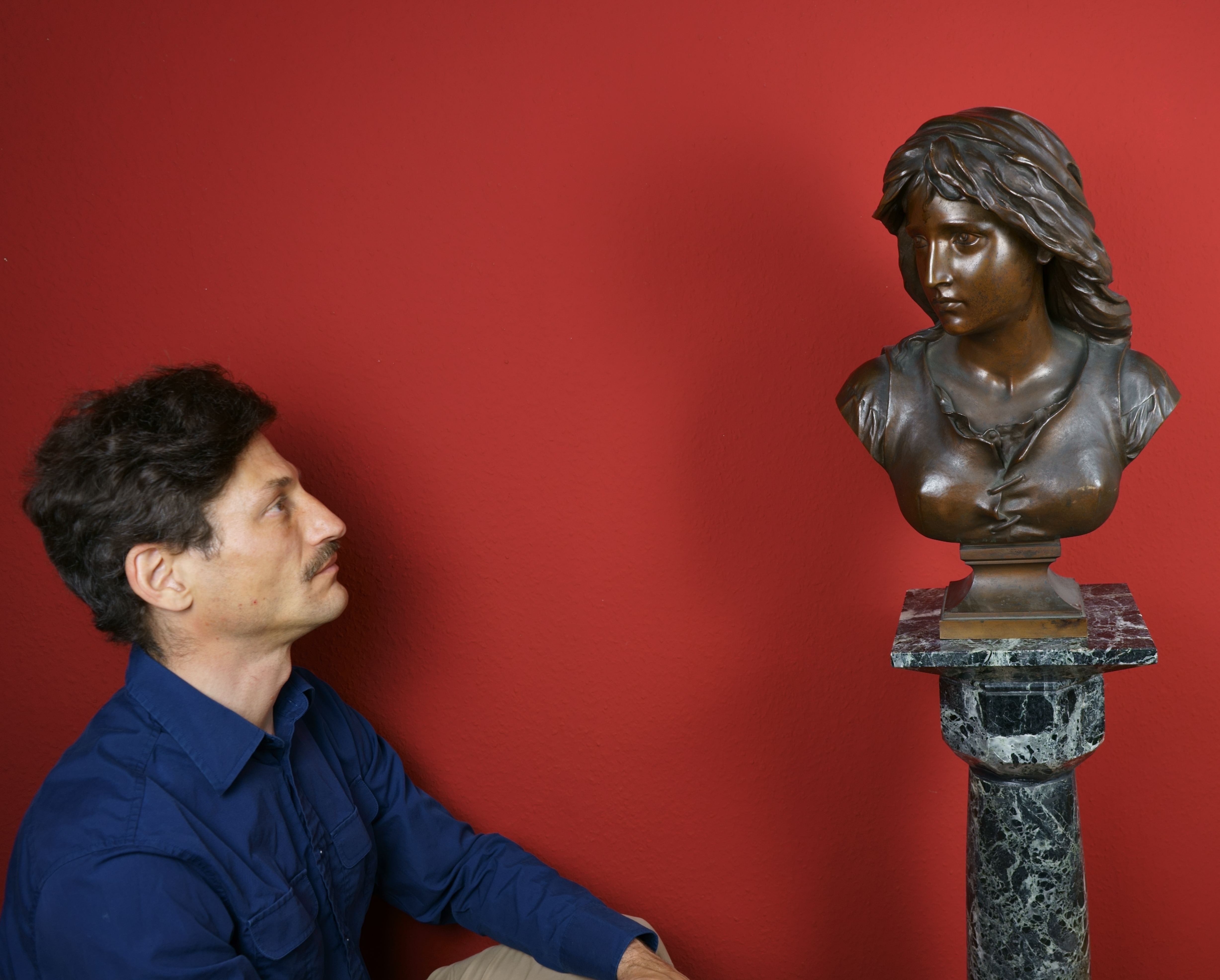
About the Seller
5.0
Vetted Professional Seller
Every seller passes strict standards for authenticity and reliability
Established in 2014
1stDibs seller since 2023
23 sales on 1stDibs
- ShippingRetrieving quote...Shipping from: Berlin, Germany
- Return Policy
More From This Seller
View AllIndistinct Clear - Fluctuating ambivalence -
Located in Berlin, DE
Karl Ludwig Mordstein (1937 Füssen - 2006 Wilszhofen), Undeutlicher deutlich, 1982. Color etching, e.a. (Epreuve d'artiste) 4/9, 22.5 x 28 cm (image), 40 x 45 cm (sheet), 43 x 48 cm ...
Category
1980s Abstract Abstract Prints
Materials
Etching
$455 Sale Price
20% Off
Field - Field research -
Located in Berlin, DE
Karl Ludwig Mordstein (1937 Füssen - 2006 Wilszhofen), Field 1983. Color etching, copy 13/65, 22.5 x 28 cm (image), 40 x 45 cm (sheet), 43 x 48 cm (frame), titled, numbered, monogram...
Category
1980s Abstract Abstract Prints
Materials
Etching
$426 Sale Price
20% Off
Untitled / - The archaism of nature -
Located in Berlin, DE
Jorge Machold (1940 Chemnitz - 2015 Berlin), Untitled, 1973. Color etching, 41.5 x 29.2 cm (plate size), 49.5 cm x 39.5 cm (sheet size), signed lower right in lead “J.[orge] Machold”...
Category
1970s Abstract Abstract Prints
Materials
Paper
Untitled / - Association -
Located in Berlin, DE
Detlef Baltrock (*1954 Stuttgart), Untitled, 1985. Watercolor, 29.5 cm x 21 cm (visible dimensions), 41 cm x 32 cm (frame), signed “Baltrock” lower center and signed “[19]85”, label ...
Category
1980s Abstract Expressionist Abstract Drawings and Watercolors
Materials
Paper
Tectonic Tension / - Archetypes of Painting -
Located in Berlin, DE
Jürgen Möbius (*1939 Großenhain), Tectonic Tension. Oil on hardboard, 47.5 x 60 cm, 49 x 61.5 cm (frame), signed lower right "Möbius" and dated "[19]81".
- Upper left corner with a small chip, light scratches and a little rubbed in places. Provisional gallery frame with traces of use.
- Archetypes of Painting -
About the artwork
The form structure in front of the eye is overlapped by the frame. Thus, the frame does not open up a space in which something is presented, but rather shows the seemingly arbitrary section of a comprehensive context that cannot be framed as such.
We see forms that stand in a structure of tension with each other, whereby the individual black and brown forms, which continue almost endlessly beyond the frame, already show a tension in themselves, since they are not only forms, but also surfaces - form surfaces, while the light blue surface ground is at the same time forms that appear as surface forms. The formed surfaces and surface forms are nested within each other and form a structure that encompasses all elements.
The angular arrangement of the black and brown shaped surfaces gives the structure a tectonic character. The tension is thus heightened to the point of paradox, since the black shape at the front is overlapped by the brown shape at the bottom in the center of the picture, which would be impossible in real space. It is precisely through this "paradox" that Möbius demonstrates that the paradoxical is reality within painting. It is, so to speak, the most original possibility of painting, which distinguishes it from the other arts. In combination with the tectonic formations, Jürgen Möbius creates an archaic primordial painting, which, however, should not be confused with the autonomous color and form cosmos of Suprematism à la Kasimir Malevich. Instead of homogeneous, perfectly colored forms, here the colors are deliberately applied unevenly, and the light blue is mixed with the brown in a manner determined by the brushstroke. At the edges of the surface forms, the uneven application of paint allows the wood of the unprimed hardboard to show through. In this way, Möbius illustrates that we are dealing with a painting that has been created by an act of painting - an act, however, that takes hold of the original principles of painting and thus realizes painting as such.
About the artist
From 1959 to 1965 Jürgen Möbius studied painting at the University Institute for Art and Work Education in Mainz. He also studied philosophy and art history at the University of Mainz. Afterwards he worked as a freelance artist in Mainz.
At first, Möbius created material reliefs and installations, then, around 1974, he turned increasingly to conceptual art and added cinematic means. During this phase he wrote the manifesto-like essay "Principles of Supranatural Landscape" (1979).
From 1981 on, Möbius concentrated on painting and searched for artistic ways to "treat intellectual and sensual perception equally in the fusion of representational and abstract pictorial elements" (Wolfgang Zemter). He found inspiration on his study trips to Thailand and Sri Lanka.
"The pure painting of Jürgen Möbius flows through us as a timeless expression of memory and energy, ploughing our perception and bringing us the happiness of seeing authentic, immovable form.
- Philippe Büttner
Selection of solo exhibitions
1969 Galerie Würzner, Düsseldorf / Galerie Gurlitt, Mainz
1972 Städtische Galerie, Mainz
1973 Galerie Schloss Ringenberg Rathaus, Kleve
1974 Röderhausmuseum, Wuppertal
1976 Galerie Glasing, Osnabrück / Städtische Galerie, Herne
1977, 1997, 2004 Märkisches Museum, Witten
1979 Studio M, Bamberg / Staatstheater, Darmstadt
1980 Galerie Stolànovà, Wiesbaden / Mittelrheinmuseum, Koblenz
1982 Galerie Dornhöfer, Mainz
1984 Galerie Neumühle, Schlangenbad
1985 Landesmuseum, Mainz / Kunstverein, Ludwigshafen / Nassauischer Kunstverein, Wiesbaden
1986 Museum, Bochum / Galerie der Stadt Iserlohn
1987, 1990 Galerie Klaus Kiefer, Essen
1987, 2000 Galerie Ulrike Buschlinger, Wiesbaden
1988 Kunsthalle Darmstadt
1988, 1992, 1996, 1999 Galerie Leonhard, Basel
1992, 2002 Galerie Zulauf, Freisheim
1994 Galerie Remy, Vallendar
1995 Sendezentrum des Zweiten Deutschen Fernsehens, Mainz
2001 Collegium oecumenicum, Bamberg / MVB Forum für Kultur und Wirtschaft, Mainz
2006 Adam Gallery, London
Selection of group exhibitions
1969 ‘International Graphic Arts’, Galerie Dalléas Bordeaux, Paris
1975 ‘Deutscher Künstler-Bund’, Dortmund
1979 ‘Man and man’s Images’, Märkisches Museum Witten
1980 ‘Love-Dokuments of our Time’, Art Hall Darmstadt and Art Association Hannover
1982 ‘Work - Progress – Position’, Nassau Art Association Wiesbaden
1983 ‘Principle Hope – Utopic Aspects in Art and Culture of the 20th Century’, Museum Bochum
1986 ‘Selfportraits’, Gallery Klaus Kiefer Essen
1987 ‘The Dying and Death’, Gallery Klaus Kiefer Essen
1989 ‘Where are You, Revolution – Freedom, Liberty, Egality, Fraternity to-day’, Museum Bochum 1990 ‘Flight – a Problem within the Memory of Man’, Kunsthalle Darmstadt ‘Art and War 1939 – 89’, House of Cultures Berlin
1991 ‘Material and Form’, Pillnitz Castle Dresden and Pfalz Gallery Kaiserslautern
1995 20 Years Exhibitions, Chrämerhuus Langenthal, Schweiz
1998 ‘Works on Paper’, Klaus Kiefer Gallery Essen
2000 ‘Acquisitions 1900 – 2000’, Mittelrhein-Museum Koblenz
2001 ‘Strange Pictures’, Klaus Kiefer Gallery Essen
2002 ‘10 Years Buschlinger Gallery’, Buschlinger Gallery Wiesbaden
2004 ‘Eternal Space – Pictures and Sculptures’, Dome of Bamberg
2005 Art Fair Chicago, Adam Gallery, London
Selected Bibliography
Mittelrheinisches Landesmuseum (Hrsg.): Jürgen Möbius - Neue Bilder, Mainz 1985.
Kunstverein Darmstadt (Hrsg.): Jürgen Möbius. Bilder 1985 - 1988. Kunsthalle Darmstadt, 26. Juni - 14. August 1988. Red. Dorit Marhenke, Lyrik Marcus Schiltenwolf, Düsseldorf 1988.
Gabriele Prusko (Hrsg.): Jürgen Möbius. Mit Texten von Philippe Büttner und Ralph Mieritz, Basel 1992.
Wolfgang Zemter (Hrsg.): Jürgen Möbius - Aktuelle Arbeiten. Märkisches Museum der Stadt Witten, Bönen 1999.
Wolfgang Zemter (Hrsg.): Jürgen Möbius. Flieger in meinem Zimmer und Beruhigte Zone, Bönen 2004.
Dama Gallery...
Category
1980s Abstract Abstract Paintings
Materials
Oil
$1,328 Sale Price
20% Off
My treasure, my sanctuary / - A Tortured Treasure -
Located in Berlin, DE
Johannes Heisig (*1953 Leipzig), "My treasure, my sanctuary" - To the Christmas Oratorio by Johann Sebastian Bach. Lithograph on strong yellowish laid paper with watermark, 53 x 39.5...
Category
1980s Abstract Expressionist Figurative Prints
Materials
Lithograph
$360 Sale Price
20% Off
You May Also Like
February (abstract print from Domberger series)
By Karl Fred Dahmen
Located in New York, NY
From the "Edition Domberger 1980"
Signed and numbered with publisher embossing
Category
20th Century Abstract Expressionist Abstract Prints
Materials
Screen
Price Upon Request
Abstract Enviroment
By Hans Gustav Burkhardt
Located in West Hollywood, CA
Presenting an exceptional abstract pen and ink by American artist Hans Burkhardt.
"Abstract Enviroment", is an original pen and ink on paper, signed, dated 1963, 18 x 23.5 inches.
Category
1960s Abstract Drawings and Watercolors
Price Upon Request
Entfernung (Serie) - 3/30 - Nr.5
Located in Wien, 9
Auguste Kronheim was born in Amsterdam in 1937. The artist makes woodcuts and drawings. She received her training in drawing from Hanns Kobinger and graduated from the Linz Federal T...
Category
20th Century Modern Abstract Prints
Materials
Woodcut
"Komposition" (Composition)
By Bernhard Heiliger
Located in Kansas City, MO
Bernhard Heiliger
“Composition III”, 1967
Medium: Lithograph
Signed, numbered or inscribed
Edition: 100 + H.C.
Size: 20.5 × 12.9 on 25.5 × 19.7 inches
COA provided
Bernhard Heiliger...
Category
1960s Abstract Abstract Prints
Materials
Lithograph
"Komposition" (Composition)
By Bernhard Heiliger
Located in Kansas City, MO
Bernhard Heiliger
“Composition”, 1967
Medium: Lithograph
Signed, numbered or inscribed
Edition: 100 + H.C.
Size: 20.5 × 12.9 on 25.5 × 19.7 inches
COA provided
Bernhard Heiliger (11...
Category
1960s Abstract Portrait Prints
Materials
Lithograph
Untitled
Located in Austin, TX
Artist: Helmut Barnett
Medium: Mixed Media Lithograph
Sheet Size: 12" x 10"
Framing: Framed
Condition: Excellent
Category
21st Century and Contemporary Abstract Abstract Prints
Materials
Mixed Media, Lithograph
$1,200
